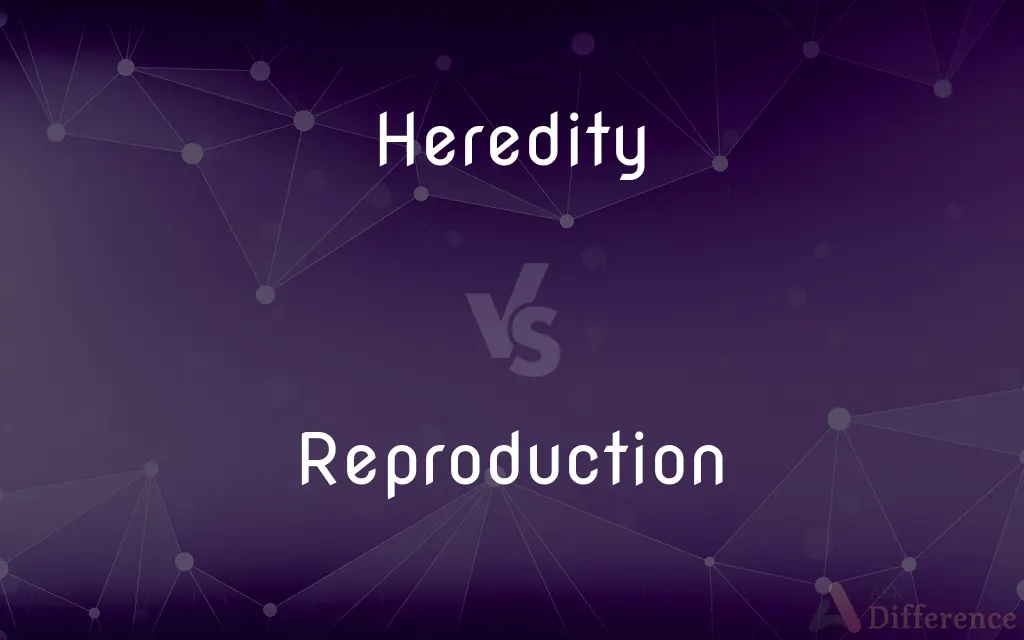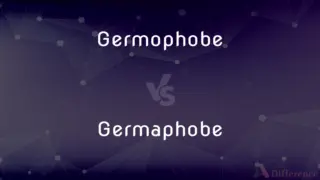Heredity vs. Reproduction — What's the Difference?
Edited by Tayyaba Rehman — By Urooj Arif — Updated on April 22, 2024
Heredity involves the genetic transmission of traits from parents to offspring, while reproduction is the biological process by which new individual organisms are produced.

Difference Between Heredity and Reproduction
Table of Contents
ADVERTISEMENT
Key Differences
Heredity is the mechanism through which genetic traits, characteristics, and predispositions are passed from parents to their children, determining aspects like eye color, height, and disease susceptibility. On the other hand, reproduction is the actual process of producing new life, which can occur through sexual or asexual means, depending on the species.
In reproduction, which involves two parents, heredity plays a crucial role as it combines the genetic material of both parents, leading to genetically unique offspring. Conversely, in reproduction, such as binary fission or budding seen in many microorganisms and some plants, there is no genetic mixing, thus heredity transfers nearly identical genetic information to the progeny.
Heredity is deeply influenced by genetics, where DNA is the fundamental molecule carrying genetic information. This contrasts with reproduction, where the focus is more on the biological and physiological processes that lead to the generation of new individuals, such as gestation in mammals or spawning in fish.
The study of heredity, known as genetics, delves into how specific traits or disorders are passed down through generations, exploring concepts like dominant and recessive genes. Reproduction, studied under various biological fields including developmental biology, emphasizes understanding the mechanisms that organisms use to reproduce, such as mating rituals, pollination in plants, and embryonic development.
While heredity is a continuous process affecting generations over time and maintaining genetic continuity, reproduction can be viewed as a single-event biological process in an individual's life, leading to the creation of new organisms that may then continue the cycle of life.
ADVERTISEMENT
Comparison Chart
Definition
Transmission of genetic traits from parents to offspring
Biological process of producing new organisms
Key Mechanism
Genetic inheritance via DNA
Sexual or asexual cellular processes
Study Field
Genetics
Developmental biology, reproductive biology
Focus
Genetic continuity and variation
Biological cycle and survival of species
Examples
Eye color, blood type, genetic disorders
Mating, gestation, seed dispersal
Compare with Definitions
Heredity
Inherited features that are encoded in DNA.
His height is influenced by the genes he inherited—a classic case of heredity.
Reproduction
Biological cycle involving mating, fertilization, and birth.
The reproduction cycle of elephants is notably long, taking 22 months.
Heredity
The study of genetic inheritance.
She studies heredity to understand how certain traits are passed down.
Reproduction
Ensuring the survival of species through generation of offspring.
The reproduction of endangered species is often assisted by human intervention in zoos.
Heredity
Biological inheritance patterns within a family.
Patterns of baldness in his family can be traced through heredity.
Reproduction
The mechanism of producing new cells or organisms.
Bacteria reproduction through binary fission is rapid and efficient.
Heredity
The passing down of traits through generations.
The family's resistance to certain diseases is a matter of heredity.
Reproduction
The process by which organisms produce new individuals.
Sexual reproduction in plants involves pollination.
Heredity
Heredity, also called inheritance or biological inheritance, is the passing on of traits from parents to their offspring; either through asexual reproduction or sexual reproduction, the offspring cells or organisms acquire the genetic information of their parents. Through heredity, variations between individuals can accumulate and cause species to evolve by natural selection.
Reproduction
The creation of a new life from one or more organisms.
Jellyfish reproduction can occur both sexually and asexually.
Heredity
The genetic transmission of characteristics from parent to offspring.
Reproduction
Reproduction (or procreation or breeding) is the biological process by which new individual organisms – "offspring" – are produced from their "parent" or parents. Reproduction is a fundamental feature of all known life; each individual organism exists as the result of reproduction.
Heredity
The sum of characteristics and associated potentialities transmitted genetically to an individual organism.
Reproduction
The act of reproducing or the condition or process of being reproduced.
Heredity
Hereditary transmission of the physical and genetic qualities of parents to their offspring; the biological law by which living beings tend to repeat their characteristics in their descendants.
Reproduction
Something reproduced, especially in the faithfulness of its resemblance to the form and elements of the original
A fine reproduction of a painting by Matisse.
Heredity
Hereditary transmission of the physical and psychical qualities of parents to their offspring; the biological law by which living beings tend to repeat their characteristics in their descendants. See Pangenesis.
Reproduction
(Biology) The sexual or asexual process by which organisms generate new individuals of the same kind; procreation.
Heredity
The biological process whereby genetic factors are transmitted from one generation to the next
Reproduction
The act of reproducing new individuals biologically.
Heredity
The total of inherited attributes
Reproduction
The act of making copies.
Unauthorized reproduction of this article is prohibited.
Reproduction
A copy of something, as in a piece of art; a duplicate.
Reproduction
(computing) A method for reproducing a bug or problem.
Reproduction
The act or process of reproducing; the state of being reproduced
Reproduction
That which is reproduced.
Reproduction
The process of generating offspring
Reproduction
Recall that is hypothesized to work by storing the original stimulus input and reproducing it during recall
Reproduction
Copy that is not the original; something that has been copied
Reproduction
The act of making copies;
Gutenberg's reproduction of holy texts was far more efficient
Reproduction
The sexual activity of conceiving and bearing offspring
Common Curiosities
Can heredity affect the reproductive success of an organism?
Yes, genetic traits inherited through heredity can influence an organism’s reproductive capabilities and success.
How do heredity and reproduction differ in asexual organisms?
In asexual reproduction, heredity involves passing an almost identical genetic makeup, as there is no mixing of genes from two parents.
What are some examples of traits influenced by heredity?
Traits like skin color, height, and predisposition to certain diseases are influenced by heredity.
How do mutations relate to heredity and reproduction?
Mutations are changes in DNA that can be passed through heredity during reproduction, potentially leading to genetic diversity or disorders.
How have human interventions affected natural reproduction and heredity processes?
Human interventions, such as selective breeding and genetic engineering, have significantly altered natural reproduction and heredity, sometimes enhancing desirable traits or eliminating harmful ones.
Why is understanding heredity important for medical science?
Understanding heredity is crucial for predicting, diagnosing, and treating genetic disorders.
What is the relationship between heredity and reproduction?
Heredity and reproduction are interconnected; heredity deals with the genetic aspects passed during reproduction.
What are the ethical considerations in manipulating heredity and reproduction?
Ethical considerations include the potential consequences of genetic modifications and the rights of individuals to know and control their genetic information.
What role does the environment play in heredity and reproduction?
While heredity passes genetic traits, environmental factors can influence how these traits are expressed and the overall reproductive success.
Can heredity influence behavior?
Yes, certain behavioral traits can be inherited from parents through genes, although behavior is also significantly shaped by the environment.
Share Your Discovery

Previous Comparison
Germophobe vs. Germaphobe
Next Comparison
Ruminate vs. CogitateAuthor Spotlight
Written by
Urooj ArifUrooj is a skilled content writer at Ask Difference, known for her exceptional ability to simplify complex topics into engaging and informative content. With a passion for research and a flair for clear, concise writing, she consistently delivers articles that resonate with our diverse audience.
Edited by
Tayyaba RehmanTayyaba Rehman is a distinguished writer, currently serving as a primary contributor to askdifference.com. As a researcher in semantics and etymology, Tayyaba's passion for the complexity of languages and their distinctions has found a perfect home on the platform. Tayyaba delves into the intricacies of language, distinguishing between commonly confused words and phrases, thereby providing clarity for readers worldwide.














































